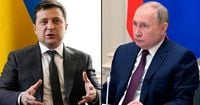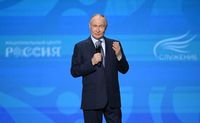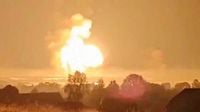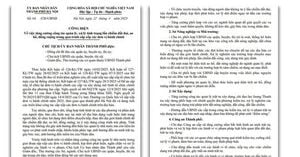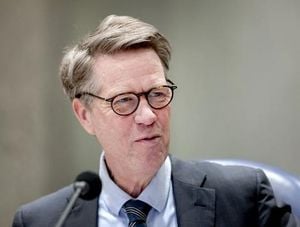In a significant development regarding the ongoing conflict between Ukraine and Russia, Ukrainian President Volodymyr Zelensky announced on April 22, 2025, that Ukraine is ready to engage in negotiations with Russia under the condition that a ceasefire is established. This statement came during a press conference held at the presidential office in Kyiv, where Zelensky emphasized the need for a peaceful resolution to the conflict that has now entered its fourth year.
Zelensky stated, "We are ready to agree that after a ceasefire, we are prepared to sit down for negotiations in any format to avoid a deadlock." His remarks reflect a cautious optimism about the potential for dialogue, although he underscored that any discussions regarding peace agreements should only occur once hostilities have ceased.
On the same day, Charles Michel, the President of the European Council, extended an invitation to Russian President Vladimir Putin to engage in talks aimed at resolving the conflict. Michel expressed deep concern about the security situation in Ukraine and highlighted the necessity for a collaborative approach to achieve lasting peace.
In a related meeting scheduled for April 23, 2025, in London, Ukrainian representatives are expected to discuss the possibility of a comprehensive or partial ceasefire with officials from Western nations. Zelensky has authorized his delegation to negotiate this crucial aspect, indicating that Ukraine is actively seeking diplomatic solutions.
Meanwhile, the Kremlin has indicated a willingness to engage in discussions about not targeting civilian infrastructure. Dmitry Peskov, a spokesperson for President Putin, reiterated that the Russian leader has consistently shown openness to negotiations. This includes addressing the issue of civilian safety during military operations, a point that has been a significant concern for both sides.
However, the path to peace remains fraught with challenges. Zelensky pointed out that the complexities of the situation, including territorial claims, security guarantees, and Ukraine's potential NATO membership, must be navigated carefully. He stated, "There are many complex issues that need to be resolved, including territorial claims and security guarantees."
As the dialogue unfolds, both sides are under pressure to make progress. In a previous statement, former U.S. President Donald Trump warned that Washington might withdraw from its mediating role if significant advancements are not made soon. This sentiment underscores the urgency of the situation and the need for both parties to find common ground.
In the backdrop of these diplomatic efforts, the conflict continues to escalate on the ground. Reports from Odessa indicate that Russian forces launched an attack involving 54 drones, injuring three individuals and causing extensive damage to residential buildings. Hennadii Trukhanov, the mayor of Odessa, confirmed the attacks, stating, "The enemy is targeting residential areas densely populated in Odessa." The Ukrainian Air Force reported that while 38 of the drones were intercepted, 16 managed to reach their targets, highlighting the ongoing threat posed by aerial assaults.
In light of these developments, cyber warfare has also emerged as a significant concern. Ukrainian officials revealed that a cyber attack on the national railway system, attributed to Russian-backed hackers, disrupted services and demonstrated the vulnerabilities of critical infrastructure. The government characterized this attack as "terrorism," given its widespread impact on public services.
Furthermore, the discussions surrounding the potential recognition of Crimea as Russian territory have surfaced again. Reports suggest that Washington may be considering a proposal to officially acknowledge Crimea as part of Russia as part of a broader resolution to the conflict. However, Zelensky has firmly stated that Ukraine will not accept the annexation of Crimea and will continue to seek control over all territories lost during the conflict.
As negotiations progress, the international community is closely watching the situation. The European Council meeting in London is expected to address the conflict in detail, with Michel indicating that the resolution will not be easy but is necessary for stability in the region. He emphasized, "We are ready to guarantee that after the ceasefire, we are ready to lower the price in every way so that it is not too far."
In summary, the situation in Ukraine remains complex and fluid, with ongoing military actions juxtaposed against diplomatic efforts to achieve peace. Both sides appear to be negotiating from a position of necessity, with the hope that a ceasefire can pave the way for more substantive discussions. The coming days may prove crucial as representatives from Ukraine and Western nations gather in London to explore pathways to resolving this protracted conflict.
